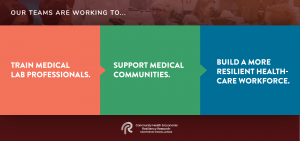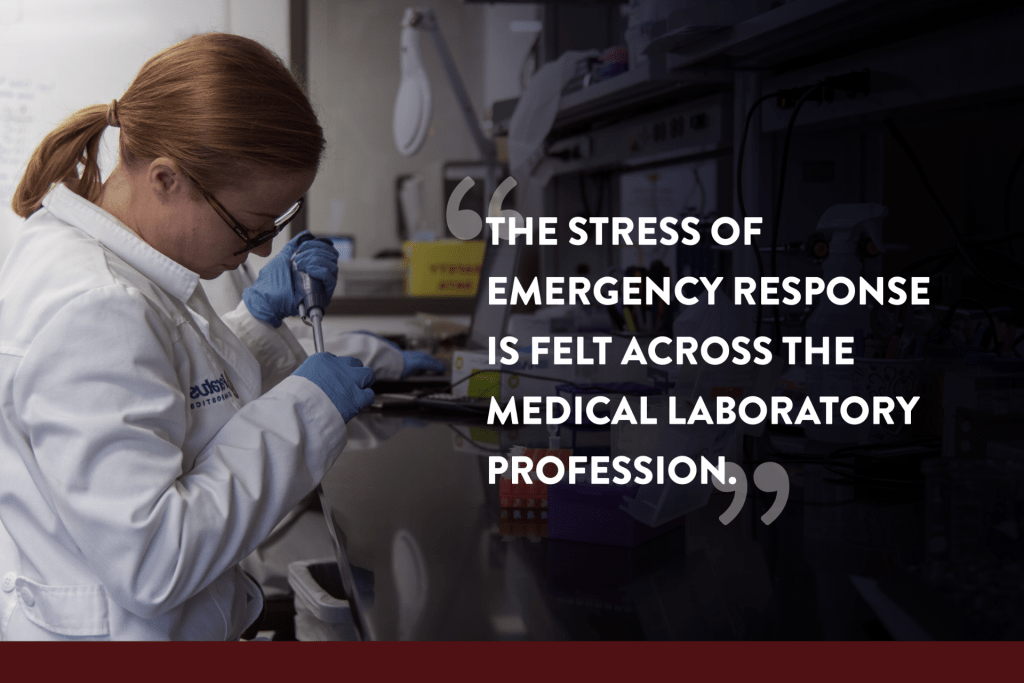Rodney E. Rohde, Regents’ Professor of Clinical Laboratory Science at Texas State University, shares a formula for resilience amid his professional community’s critical staffing shortage
It was the summer of 2020, in the thick of the pandemic surge, when Doryan Redding, MLS(ASCP)CM, received a memo from her hospital’s network. A critical staffing shortage had struck the hospital laboratories at several facilities. To ensure patients could receive accurate and efficient diagnoses, Doryan took on volunteer shifts in additional labs. Following 8+ hours at her main facility, she drove down the road to the next hospital to work until 11 p.m., sometimes four times a week, for more than four months. Doryan is a Medical Laboratory Scientist (MLS) and recent Texas State alumna (BSCLS, ’20) who entered her profession in the middle of the COVID-19 crisis. Her training, emergency response experiences, and connection with the laboratory professional community have helped her build resilience in the field.
A nation-wide staffing shortage
While staffing shortages have rocked all levels of health care, medical laboratories took a hard hit. Medical laboratory professionals (also referred to as clinical laboratory professionals) conduct tests that provide other healthcare professionals with the information they need to save lives. Although more Americans are aware of the need for testing in relation to COVID-19, the medical laboratory field remains largely unseen. As Doryan explains, there are simply not enough laboratory professionals in the field to meet the demand of losses.
Training for emergency response
Medical laboratory professionals undergo military-like training in preparation for the war of health care. The resilience these professionals build through their education and on-the-job training allows them to meet critical needs when emergencies and crises strike, from natural disasters and mass shootings to disease outbreaks.
Still, training only gets you so far. Doryan shared that in her first position out of college, she observed that her colleagues who had been in the field for more than 40 years were equally perplexed by the mysteries of COVID-19. With resilience and adaptability, lab professionals know that they have never seen everything. Doryan said that at the start of the pandemic, she and her colleagues experienced tremendous pressure. On top of fulfilling regular testing needs, they had to adapt to the FDA’s emergency authorizations and the accompanying onslaught of paperwork. “To put it simply,” she said, “we were not prepared.”
Emergency responders build resilience
The stress of emergency response is felt across the medical laboratory profession. I experienced a similar challenge early in my career. Before I became an educator, I worked in the trenches at the Texas Department of Health’s State Services Bureau of Laboratories and Zoonosis Control Divison (DSHS-ZCD). While new to the field, I was also thrust into emergency response. There was a rabies outbreak among wild animals and livestock across Southern Texas and at the Mexico border. Tragically, two people died of rabies. Then-governor, Ann Richards, declared a state public health emergency. The Texas National Guard, Canadian pioneers of the oral vaccine air-drop method, and other rabies researchers lept into an international- and national public health intervention.
Like Doryan, I was brand-new and felt the pressure of participating in an emergency response. I leaned on my education—my undergraduate training in microbiology and my graduate work with virology—to contribute to the development of a new rabies PCR test that would differentiate between variants of the virus. For seven years, I worked with one foot in the lab and the other in the zoonosis control division as a molecular epidemiologist tracking rabies variants across Texas and beyond.
While this was an incredibly stressful time, it provided the space for me to build resilience both professionally and personally.
Support systems shape resilient professionals
How do we not crumble under the stress of it all? Support systems play a big role. Early in my career, especially, I looked to my family, mentors, and colleagues for support. This is a key element that helped me build resilience: a community that had my back while I was pushed to my limit. Likewise, this community provided context and experience in handling public health crises.
At Texas State’s Clinical Laboratory Science (CLS) Program, we try to do exactly that: push our students while providing a safe and supportive space to learn. We understand that our most resilient healthcare professionals develop a thick skin through training and preparation. Faculty become unofficial counselors, cheerleaders, and drill sergeants. We encourage students to make mistakes, ask for help, and rely on their community while at Texas State so that we can help them become professionals who will never repeat the same error. In the medical laboratory field, there is no room for mistakes because it can impact someone’s life. We push our students because we believe we’re doing no favors for anyone by dropping people into health care without the highest level of preparation.
That’s why our program is rigorous. Students must master critical areas of medicine: microbiology, clinical chemistry, hematology, quality control such as correlation and validation, and immunohematology (blood banking). It’s an enormous undertaking at the undergraduate level. I often tell my students, alumni and colleagues that our program is like majoring in each area. Further, one must exhibit competence in both theory and practice without forgetting the material to obtain the MLS (ASCP)CM credential required to practice post-graduation.
A desire to help drives resilience
I can’t understate the depth of understanding across a wide range of studies that is required of our students. Through training, they build resilience. But there’s often another drive that pushes particularly resilient individuals to enter the field. For Sarah Olsen, one of our current CLS students, it was the desire to help people. “While in pursuit of a college degree that fulfilled my need to help others,” she said, “I discovered a deep interest in how we can harness science to solve issues in public health.” She found that through medical laboratory science, she could contribute to a patient’s diagnosis while remaining committed to her passion for science.
Doryan echoed this sentiment: “We recognize that there are patients behind every sample, and we care about them.”
Resilient professional communities
Building resilience is an ongoing process. Our alumni continue to work long hours while constantly training temporary hires to compensate for the nationwide staffing shortage. Doryan reflects that, while every day redefines what she can expect on the job, seeing her colleagues recognize the importance of their work and give 100% in the lab helps her become more resilient, too.
While healthcare professionals remain in emergency-response mode, we stay connected with our alumni and share stories. This helps build resilience across the laboratory professional community, as a whole. When we’re through the thick of the pandemic, our dedicated CLS faculty are confident that our alumni and lab professionals across the country will look back on this challenging period and realize that it made them more resilient. They will be the seasoned veterans who lead us forward.
Get in touch
If you are interested in learning more about, funding a project supported by, or partnering with CHERR or the Clinical Laboratory Science Program, send us a note at helloCHERR@txstate.edu.
By working together, we can apply research to discover solutions. This is TXST NEXT.

About the author
Rodney E. Rohde, PhD is a Regents’ Professor, Texas State University System, University Distinguished Professor, and Chair for the Clinical Laboratory Science (CLS) Program in the College of Health Professions at Texas State University. He also serves as Associate Director for the Translational Health Research Center. Dr. Rohde is a Global Fellow, Fellow of the Association of Clinical Scientists, and Honorary Professor of International studies. He is an ASCP board-certified Specialist in Virology, Microbiology, and Molecular Biology.
